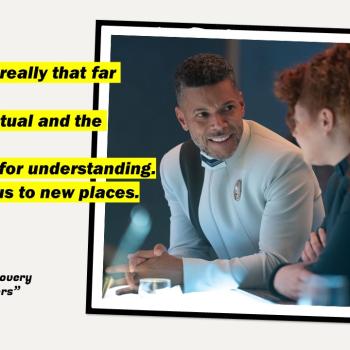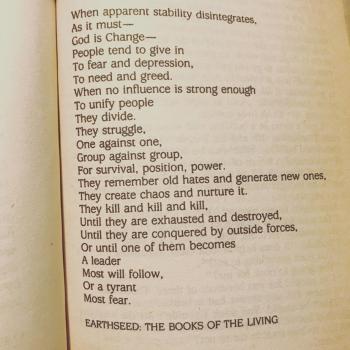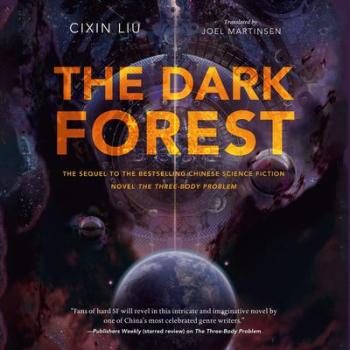I have been working on rectifying one of the gaps in my Star Trek viewing. Until Strange New Worlds did its Lower Decks crossover episode, I hadn’t watched any of that animated series. I am thus one of very few people for whom Lower Decks is a bit like Clone Wars is for Star Wars, an animated depiction of characters that I have a real-world image of from the outset. There’s a lot that’s entertaining. If you haven’t watched it, I can recommend it. Just the episodes featuring the character Peanut Hamper are enough to justify the investment of time.
I don’t always blog about shows I watch, but when there is a religious angle, you know I will. That hasn’t been the case with Lower Decks until I reached episode 8 of season 3, “Crisis Point 2: Paradoxus.” It is the sequel to an earlier episode in which a holodeck movie-making endeavor proves therapeutic to one of the crew. The episode is thus meta in a wide variety of ways. The two episodes together are humorous and profound at the same time in much the same way that the Black Mirror episode “Joan is Awful” was. I didn’t really like the last episode of Black Mirror, most of which was horror with little of the critical perspective on future technology that has characterized the show up until now. “Joan is Awful” was the exception. It was ‘meta’ in many of the ways this Lower Decks episode is. All of these stories are about ourselves in and as stories. We always make ourselves the hero of our own narrative but when we seek to be the center, the imagined hero, that regularly turns us into the villain. The Lower Decks episodes are less about that and more about the quest for self-discovery and meaning, in one case unacknowledged, in the other undertaken deliberately.
It often seems silly to preface an older episode with a spoiler alert, especially when it is an animated one. In this case, I don’t think that knowing where the episode explores would spoil your enjoyment of watching it. But even so, consider yourself warned if you read further.
Brad Boimler receives news while he and his friends are just starting to participate in his holodeck movie. When he returns, he decides to go off script and follow a side plot that is clearly being spun on the fly by the holodeck, in search of wise figure who may be able to provide illumination. We eventually learn that he is doing so because of the news he received. His duplicate from a transporter accident in an earlier episode had been killed. Even more so than one imagines would be the case if one’s identical twin died, when someone who shares all your experiences and memories up until a relatively recent point is killed, it is bound to have you wondering about the meaning of life. Boimler presses on until he encounters a rock named Ki-Ty-Ha that is “supposed to be the Almighty.” When he asks it about the meaning of life, it churns out inspirational quotes. Since ultimately it is the holodeck AI that is doing this, I find this to be a truly poignant and relevant commentary on our AI technology. People are looking to it for wisdom and do not realize that it might manage to shuffle around word arrangements so that its answer to a question about the meaning of life is not exactly the same as anything that appears on an existing motivational poster. But it is imitating patterns of language in those kinds of sources. AI chatbots imitate human speech. They are not designed in such a way that they could ever provide wisdom that isn’t already available from human sources.
Boimler is so upset by this and he has a breakdown and was either unconscious or clinically dead for long enough to have a dream/vision in which he meets Captain Sulu who shares with him his own human wisdom based on lived human experience, that if he spends his life worrying about a meaningless death, he’ll never find joy in living. That this is bestowed by a character played by an actor that many real world fans follow on social media and whose wisdom and humor we benefit from, in a holodeck or is it a dream or is it a near death experience context, just makes it wonderfully meta without in any sense becoming less insightful. There are other human beings who are wiser than we are, and we should seek their wisdom. Our subconscious seems to realize things that elude the grasp of our conscious mind, and we should listen to it. Whether there is a divine voice reaching out to us by such means, we could never hope to ascertain. If we insist on demanding that insight come with a guarantee of divine inspiration or even inerrancy, ever source we turn to will inevitably disappoint us.
On the other hand, if we approach even an animated series with an open heart and mind, and an eagerness to learn, we’ll gain new insights from doing so.













